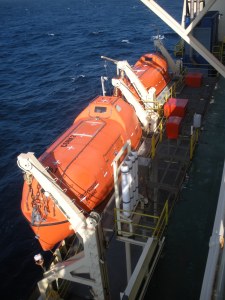I’m in Houston tonight. Prepping to take the HUET (Helicopter Underwater Escape Training) once more. So I can put a T (tropical) in front of it.
These courses are supposed to be good for 4 years. I’ve taken this course at least a half dozen times since returning to the Gulf of Mexico in mid 2007. So, averaging about once every 2 years (price has gone down some, it’s ‘only’ costing me $500 this time). Once again, this is another course I need to take in order to work. Once again, nothing has changed since the first time I took this course in 2007.
Please ignore the music of the video if ‘strong language’ offends you. I got it off youtube, last time I tried to take photos, they wouldn’t let me so I have none of my own to show you what it’s like.
We do the same things: float/swim in the pool, jump from a height wearing a life jacket, put on the life jacket, swim with the life jacket, float/swim as a group wearing life jackets/survival(gumby) suits, get in a life raft, flip the helicopter upside down in the pool and get out of it a few times. I really don’t know why these companies keep insisting we do these things over and over and over again. It’s not like you forget any of it!
And, again, nothing has changed. I just took HUET last summer. At this point, I will not be allowed to work again until I re-take it (adding the T). What is the difference between T-HUET and HUET? I tried to find something sensible. NOPE, not happening. Here’s the difference…
T-BOSIET/T-FOET/T-HUET certifications are only valid for use in tropical region (T stands for TROPICAL) while BOSIET/FOET/HUET certifications are valid for BOTH cold water and tropical water regions.
You get that? T-HUET is ONLY valid for use in tropical regions, HUET is good for BOTH cold water AND tropical waters, so pretty much worldwide. So, my question is: WHY do the companies no longer accept HUET and insist on forcing us to go take another course teaching EXACTLY the same thing, but is not good for use in nearly as many places?
It’s incredibly frustrating to me (and most other mariners I’ve talked to since all this BS started). We have ALL been trained in how to put on life jackets, survival suits, how to operate life rafts and even life boats. Most of us have had many years of weekly drills on all this sort of thing (also fire-fighting, first aid and a whole bunch of other training on things that could go wrong). We continue to do these drills (by law) every week.
Then, to add insult to injury, the companies we work for insist on everyone repeatedly being trained on things like ‘rigging’, ‘swing rope’, ‘rig pass’, even if you will probably never have to deal with any of those things in your job! The last time I had to use a swing rope was about 30 years ago (it’s really not a very safe thing to play Tarzan out there!). As an AB, I was trained VERY WELL in rigging and as a deck officer, even better. But those years of training and experience don’t mean diddly squat to these people. It really is ridiculous that a licensed officer is told they’re not qualified to work offshore because they don’t have a ‘current rigging certificate’.
It wouldn’t be quite so bad if the companies we work for would all get together and agree on some standard. Instead, we have to go and re-take the same courses over and over because one company will only accept BOSIET, one will only accept THUET, another will still accept HUET. BOSIET is pretty much the same as BST (basic safety training) that we ALL have to take every 5 years now, required and approved by the US Coast Guard (but not by OPITO which is the oil company standard setting organization- like the US Coast Guard is not up to snuff!) plus HUET.
You can’t take BST and HUET and get a BOSIET. You can’t even take BST and HUET and then take FOET (further offshore emergency training) which is basically just a renewal of BOSIET. You MUST take BOSIET first. It’s about $800 more expensive. 
Next year they’ll add another letter, or change the name. Training will still be the same, or maybe they’ll say something different for an hour (that surely could’ve been done at work), and force us to go back to take the class all over again. And no, they don’t offer any bridging courses, you have to do the whole thing over. 
I wonder, do these companies EXPECT that their helicopters are going to crash. Crash so often that every single person must be ready every single time to escape from the water? Why do only these offshore oil companies feel that way?
After all, airplanes crash just as often (probably more) than helicopters do. Do the pilots and air crew have to practice flipping their planes over in the water and escaping from a flooded plane? I asked. No, they NEVER have to do that! Much less do it a minimum of every 4 years! Do airplane companies force their passengers to practice ditching from their planes, EVER? NO, they don’t!
I want to know WHY do we have to do this same thing over and over and over. Somebody please give me a real reason. I’m not talking about insurance company BS either. I mean a REAL reason!
Some company PLEASE start up and act in a reasonable manner! Hire good, competent people and LET THEM DO THEIR JOBS! We do not need to be coddled, protected and micromanaged out the ying-yang!



